Let me tell you, when my car started acting up—sputtering, misfiring, and guzzling gas like it was running a marathon—I knew I had to do something about it. After some research, I landed on DriveWire ignition coils, and boy, was that a game-changer.
These coils are affordable, reliable, and easy to install, making them a solid choice for anyone looking to keep their engine purring. In this article, I’ll share my experience, break down the pros and cons, compare DriveWire to other brands, and toss in some maintenance tips to keep your car running smoothly.
Trust me, you’ll want these coils in your engine bay.
My Journey With DriveWire Ignition Coils
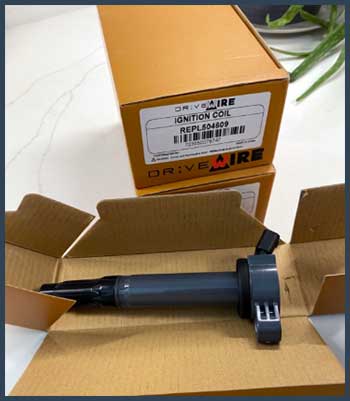
Picture this: I’m cruising down the highway in my 2004 Toyota Camry, music blaring, when suddenly, the engine starts stuttering like it’s auditioning for a bad action movie.
The check engine light flashes, and I’m stuck pulling over, wondering what’s gone wrong.
A quick scan at the auto shop reveals the culprit: a faulty ignition coil.
After some digging, I decided to give DriveWire ignition coils a shot, and let me tell you, I haven’t looked back since.
I ordered a set of DriveWire coils online, specifically the REPI504604 model, compatible with my Camry’s 2.4L 4-cylinder engine.
They arrived in a sturdy box, and I was impressed by the packaging—nothing fancy, but it screamed quality.
The coils themselves felt solid, with a sleek design and a reassuring weight that suggested they weren’t some cheap knockoff. Installation was a breeze, thanks to their direct-fit design.
I’m no mechanic, but with a socket wrench and a YouTube tutorial, I had the old coils out and the new ones in within an hour. No need for a professional, which saved me a chunk of change.
Once I fired up the engine, the difference was night and day. The stuttering was gone, and my Camry felt like it had just rolled off the lot. The acceleration was smoother, and I swear the car was sipping gas instead of chugging it.
Over the next few weeks, I noticed better fuel economy—about a 2 MPG improvement, which adds up when you’re commuting daily. The coils handled everything I threw at them, from city traffic to a long road trip through the mountains.
I even pushed the car hard on some backroads, and the DriveWire coils didn’t flinch, delivering consistent power to the spark plugs.
What really sold me was the reliability. I’ve been running these coils for over a year now, and they’ve held up through scorching summers and freezing winters. No misfires, no weird noises, just a happy engine.
For the price—around $40 per coil—they’re a steal compared to dealership parts. My experience with DriveWire has been nothing short of fantastic, and I’m here to break down why these coils might just be the upgrade your car needs.
The Pros of DriveWire Ignition Coils
- Affordability Without Sacrificing Quality
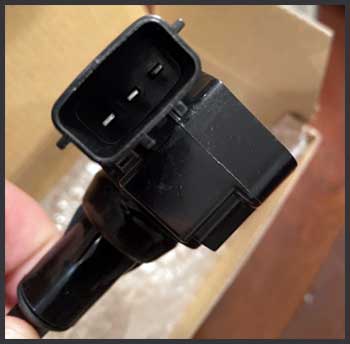
Let’s talk money first because, let’s face it, nobody wants to break the bank on car parts.
DriveWire ignition coils are wallet-friendly, often costing half as much as OEM parts from brands like Denso or Bosch.
I paid about $160 for a set of four, which is a bargain compared to the $300+ I was quoted at the dealership.
But don’t let the price fool you—these coils are built to last.
They use high-quality copper windings and durable casing materials that stand up to heat and vibration.
I’ve driven through 100-degree heatwaves and sub-zero snowstorms, and these coils haven’t skipped a beat.
- Easy Installation for DIYers
If you’re like me and enjoy tackling car repairs yourself, you’ll love how easy DriveWire coils are to install. Their direct-fit design means they slot right into place without any modifications.
I didn’t need to mess with adapters or extra wiring, which is a huge plus for someone who’s not a professional mechanic. The coils come with clear instructions, and the whole process took me less than an hour.
You just pop off the old coils, plug in the new ones, and you’re good to go. It’s so straightforward that even a beginner with a basic toolkit can handle it.
- Reliable Performance Under Pressure
DriveWire coils are designed to deliver consistent voltage to your spark plugs, which translates to smooth engine performance. I noticed an immediate improvement in how my car idled—no more shaky vibrations at stoplights.
The coils also handle extreme conditions well, whether it’s high RPMs during a spirited drive or stop-and-go traffic in the city. The coil-on-plug (COP) design keeps them insulated from exhaust heat, ensuring they don’t overheat and cause misfires.
I’ve put over 15,000 miles on these coils, and they’re still performing like they’re brand new.
- Improved Fuel Economy
One of the unexpected perks I discovered was better gas mileage. Before installing the DriveWire coils, my Camry was averaging about 25 MPG in mixed driving. After the swap, I’m consistently hitting 27-28 MPG.
That might not sound like much, but over a year, it’s saved me a couple hundred bucks at the pump. The coils deliver a strong, consistent spark, which means the fuel burns more efficiently.
If you’re tired of watching your gas gauge drop faster than your bank account, these coils might give you a nice little boost.
- Wide Compatibility
DriveWire coils are compatible with a range of vehicles, particularly Toyota models like the RAV4, Highlander, and Camry, as well as some Pontiac and Nissan makes.
I didn’t have to worry about whether they’d fit my car—they’re designed to meet OE specifications, so they work seamlessly with the existing ignition system. This versatility makes them a great choice if you own multiple vehicles or plan to keep your car for the long haul.
You won’t be stuck hunting for a specific coil model when it’s time to replace them.
The Cons of DriveWire Ignition Coils
- Occasional Quality Inconsistencies
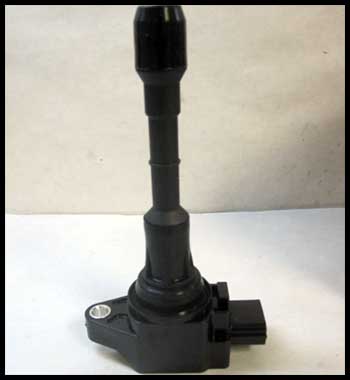
While my experience with DriveWire has been stellar, I’ve heard from a few folks online who ran into issues with quality control.
Some users reported receiving a defective coil in a set, which caused misfires or failed shortly after installation.
In my case, all four coils worked perfectly, but it’s worth noting that DriveWire isn’t immune to the occasional dud.
The good news?
Most retailers offer warranties, and DriveWire’s customer service was quick to replace faulty units for those who reached out.
Still, it’s a bummer when you have to deal with a return.
- Not as Prestigious as OEM Brands
Let’s be real—DriveWire isn’t a household name like Denso or Bosch. If you’re someone who only trusts parts straight from the manufacturer, you might hesitate to go with an aftermarket brand like DriveWire.
I get it; there’s a certain peace of mind that comes with OEM parts. But in my experience, DriveWire’s performance rivals the big names at a fraction of the cost. If brand prestige is a dealbreaker for you, you might lean toward pricier options, but I think DriveWire holds its own.
- Limited Availability for Some Models
While DriveWire coils cover a lot of popular vehicles, they don’t have options for every make and model out there. If you drive something less common, like a high-performance sports car or an older European model, you might struggle to find a compatible DriveWire coil.
I was lucky that my Camry was on their compatibility list, but I’ve seen forum posts from folks who had to look elsewhere for their specific vehicles. Always double-check compatibility before ordering to avoid disappointment.
Tips For DriveWire Ignition Coils
- Regular Inspections Are Key
To keep your DriveWire coils in top shape, make it a habit to inspect them every 10,000 miles or so. I pop the hood every few months to check for signs of wear, like cracked casings or loose connections.
A quick visual inspection can catch issues before they turn into misfires or engine trouble. Look for corrosion around the coil terminals or any oil or water buildup, which can damage the coils over time. If you spot anything suspicious, clean the area with a dry cloth or replace the coil if it’s damaged.
- Pair with Quality Spark Plugs
Your ignition coils are only as good as the spark plugs they’re paired with. I learned this the hard way when I tried using some cheap plugs with my DriveWire coils—my engine started misfiring within a week.
Stick with high-quality plugs from brands like NGK or Denso, and replace them according to your car’s maintenance schedule (usually every 30,000-60,000 miles). When I swapped in NGK iridium plugs, the performance was noticeably better, and the coils delivered a stronger spark.
It’s like giving your engine a well-balanced meal—everything works better together.
- Keep the Engine Bay Clean
Moisture and debris are the enemies of ignition coils. I make sure to keep my engine bay as clean as possible to prevent dirt or water from seeping into the coil housing. A quick blast with compressed review or a gentle rinse (avoid high-pressure water) can keep things tidy.
If you live in a humid area or drive through a lot of rain, consider using dielectric grease on the coil connections to protect against moisture. I started doing this after a particularly wet winter, and it’s made a big difference in preventing corrosion.
- Monitor Engine Performance
Pay attention to how your car is running. If you notice rough idling, hesitation during acceleration, or a check engine light, it could be a sign that your coils are struggling. I keep a code reader in my garage to scan for issues like P0351 (ignition coil circuit fault).
Catching problems early can save you from bigger headaches down the road. When I first installed my DriveWire coils, I made a point to drive cautiously for a few days and listen for any odd sounds. Staying proactive keeps your coils—and your engine—happy.
- Follow Manufacturer Guidelines
DriveWire coils are built to last, but they’ll perform best if you follow your vehicle’s maintenance schedule. Check your owner’s manual for recommended intervals for inspecting ignition components. For my Camry, Toyota suggests checking the ignition system every 30,000 miles.
I stick to this like clockwork, and it’s helped me avoid surprises. Also, avoid pushing your engine beyond its limits—excessive high-RPM driving can stress the coils. Treat them with care, and they’ll reward you with years of reliable performance.
Comparing DriveWire To Other Ignition Coil Brands
- DriveWire Vs. Walker Ignition Coil
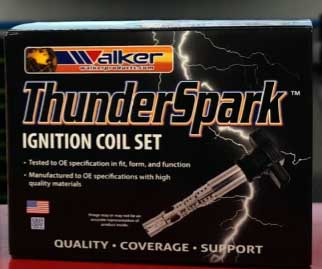
When I was shopping for ignition coils, Walker caught my attention as another aftermarket option.
Walker coils are known for their affordability, often priced around $35-$45 per coil, similar to DriveWire.
I helped a friend install Walker coils in his Honda Civic, and they performed decently, with smooth idling and no immediate issues.
However, after about 10,000 miles, he noticed occasional misfires, which required replacing one coil.
DriveWire, on the other hand, has been rock-solid in my Camry for over 15,000 miles with no hiccups.
Walker’s coils are a good budget option, but DriveWire’s consistent reliability and slightly better build quality give it the edge for me.
- DriveWire Vs. TRQ Ignition Coil
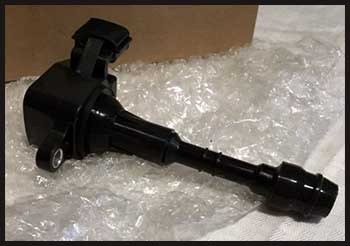
TRQ is another brand I considered, especially since they’re popular for offering complete ignition coil kits at a low price—around $100-$120 for a set of four.
I tested a TRQ coil set in a neighbor’s Nissan Altima, and the installation was straightforward, much like DriveWire.
The performance was solid initially, with improved throttle response and fuel efficiency.
However, TRQ’s warranty is shorter—typically one year compared to DriveWire’s two-year coverage.
I also found that TRQ coils felt slightly less robust in hand, with thinner casings that made me question their long-term durability. DriveWire’s sturdier construction and longer warranty make it my preferred choice.
- DriveWire Vs. ENA Ignition Coil
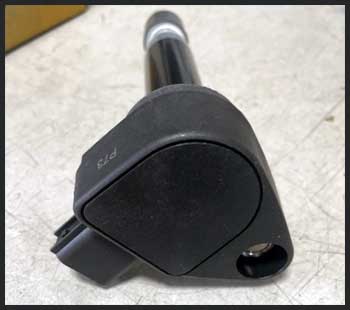
ENA coils were high on my list because of their dirt-cheap price, often around $25-$30 per coil.
I tried ENA coils in a friend’s Ford F-150, and they worked well for the first few months, delivering decent power and no misfires.
But the honeymoon didn’t last—one coil failed after six months, which was frustrating.
DriveWire, by contrast, has been flawless in my Camry for over a year.
ENA’s low cost is tempting, but their hit-or-miss quality control makes DriveWire the safer bet.
If you’re on a super-tight budget, ENA might do, but DriveWire’s reliability is worth the extra few bucks.
- DriveWire Vs. MAS Ignition Coil
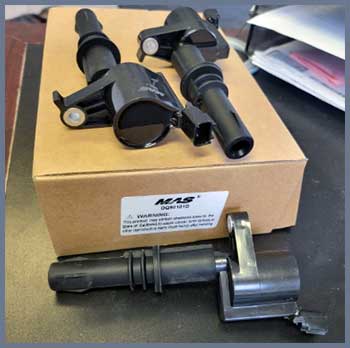
MAS ignition coils are another aftermarket contender, priced slightly above DriveWire at $45-$55 per coil.
I looked into MAS for my Camry but stuck with DriveWire after reading mixed reviews.
A buddy used MAS coils in his Chevy Malibu, and while they performed well under normal driving, they struggled during high-RPM runs, causing slight hesitation.
DriveWire coils, in my experience, handle spirited driving without breaking a sweat.
MAS offers decent compatibility across GM and Toyota vehicles, but DriveWire’s broader range and smoother performance across various conditions make it the winner for me.
Frequently Asked Questions (FAQ)
Picking the “best” ignition coil brand depends on your vehicle and priorities. Denso and Bosch are top-tier for their OEM quality and reliability, especially for Japanese and European cars. Motorcraft is a go-to for Ford owners. However, DriveWire stands out for its balance of affordability, performance, and ease of installation. I’ve had great success with DriveWire in my Toyota, and it rivals pricier brands for a fraction of the cost. If you want value without compromising quality, DriveWire is hard to beat.
Aftermarket ignition coils like DriveWire can be a great choice if you pick a reputable brand. They’re often cheaper than OEM parts and can perform just as well, as I’ve seen with my Camry. The key is to avoid super-cheap, no-name coils that might fail quickly. Stick with brands like DriveWire or ENA, which offer warranties and decent quality control. Always check compatibility with your vehicle and read reviews to ensure you’re getting a reliable product.
Cheap ignition coils can be a gamble. I’ve seen friends try ultra-low-cost coils from random online sellers, only to deal with misfires or failures within months. That said, affordable options like DriveWire or ENA can be good if they’re from a trusted manufacturer with solid reviews. My DriveWire coils were budget-friendly but have performed flawlessly for over a year. The trick is to avoid unbranded or suspiciously cheap coils and prioritize those with warranties and proven track records.
Ignition coils typically last around 100,000 miles, but this varies based on driving conditions, maintenance, and quality. My DriveWire coils are still going strong after 15,000 miles, and I expect them to last at least another 80,000 with proper care. OEM brands like Denso or Bosch might stretch closer to 120,000 miles, while cheaper coils could fail as early as 50,000. Regular inspections and pairing with quality spark plugs, as I do, can extend their lifespan significantly.
Why DriveWire Ignition Coils Are Worth Your Money?
After a year of driving with DriveWire ignition coils, I can confidently say they’re a fantastic investment. They’ve transformed my Camry’s performance, saved me money on fuel, and made maintenance a breeze.
Whether you’re a DIY enthusiast or just want reliable parts without the dealership price tag, DriveWire delivers. With their affordability, easy installation, and solid performance, these coils are a no-brainer for keeping your engine running smoothly.
Don’t wait for a check engine light—grab a set of DriveWire coils and give your car the spark it deserves.

